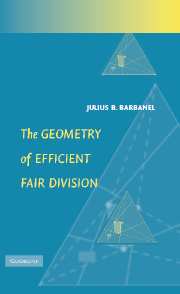Book contents
- Frontmatter
- Contents
- Introduction by Alan D. Taylor
- 1 Notation and Preliminaries
- 2 Geometric Object #1a: The Individual Pieces Set (IPS) for Two Players
- 3 What the IPS Tells Us About Fairness and Efficiency in the Two-Player Context
- 4 The Individual Pieces Set (IPS) and the Full Individual Pieces Set (FIPS) for the General n-Player Context
- 5 What the IPS and the FIPS Tell Us About Fairness and Efficiency in the General n-Player Context
- 6 Characterizing Pareto Optimality: Introduction and Preliminary Ideas
- 7 Characterizing Pareto Optimality I: The IPS and Optimization of Convex Combinations of Measures
- 8 Characterizing Pareto Optimality II: Partition Ratios
- 9 Geometric Object #2: The Radon–Nikodym Set (RNS)
- 10 Characterizing Pareto Optimality III: The RNS, Weller's Construction, and w-Association
- 11 The Shape of the IPS
- 12 The Relationship Between the IPS and the RNS
- 13 Other Issues Involving Weller's Construction, Partition Ratios, and Pareto Optimality
- 14 Strong Pareto Optimality
- 15 Characterizing Pareto Optimality Using Hyperreal Numbers
- 16 Geometric Object #1d: The Multicake Individual Pieces Set (MIPS) Symmetry Restored
- References
- Index
- Symbol and Abbreviations Index
5 - What the IPS and the FIPS Tell Us About Fairness and Efficiency in the General n-Player Context
Published online by Cambridge University Press: 19 August 2009
- Frontmatter
- Contents
- Introduction by Alan D. Taylor
- 1 Notation and Preliminaries
- 2 Geometric Object #1a: The Individual Pieces Set (IPS) for Two Players
- 3 What the IPS Tells Us About Fairness and Efficiency in the Two-Player Context
- 4 The Individual Pieces Set (IPS) and the Full Individual Pieces Set (FIPS) for the General n-Player Context
- 5 What the IPS and the FIPS Tell Us About Fairness and Efficiency in the General n-Player Context
- 6 Characterizing Pareto Optimality: Introduction and Preliminary Ideas
- 7 Characterizing Pareto Optimality I: The IPS and Optimization of Convex Combinations of Measures
- 8 Characterizing Pareto Optimality II: Partition Ratios
- 9 Geometric Object #2: The Radon–Nikodym Set (RNS)
- 10 Characterizing Pareto Optimality III: The RNS, Weller's Construction, and w-Association
- 11 The Shape of the IPS
- 12 The Relationship Between the IPS and the RNS
- 13 Other Issues Involving Weller's Construction, Partition Ratios, and Pareto Optimality
- 14 Strong Pareto Optimality
- 15 Characterizing Pareto Optimality Using Hyperreal Numbers
- 16 Geometric Object #1d: The Multicake Individual Pieces Set (MIPS) Symmetry Restored
- References
- Index
- Symbol and Abbreviations Index
Summary
In this chapter, we consider generalizations of our fairness and efficiency results from Chapter 3 to the general n-player context. In Section 5A, we consider fairness; in Section 5B, we consider efficiency; and in Section 5C, we consider fairness and efficiency together. In these sections, we assume that the measures are absolutely continuous with respect to each other. In Section 5D, we consider the situation when absolute continuity fails. In Section 5E, where we consider examples and open questions, absolute continuity will sometimes hold and sometimes fail.
Fairness
We begin by recalling that, when there are two players, proportionality and envy-freeness correspond, as do strong proportionality, strong envy-freeness, and super envy-freeness. The following two facts are implied by Corollary 3.3 for the two-player context.
Fact 1: There exist infinitely many mutually non-s-equivalent partitions that are proportional and envy-free.
Fact 2: There exist partitions that are strongly proportional, strongly envy-free, and super envy-free if and only if the measures are not equal (and, in this case, there are infinitely many mutually non-p-equivalent such partitions).
Analogous facts for chores fairness properties are implied by Corollary 3.5.
The natural guess for the generalization of Fact 1 when there are more than two players is obvious and turns out to be true.
- Type
- Chapter
- Information
- The Geometry of Efficient Fair Division , pp. 82 - 150Publisher: Cambridge University PressPrint publication year: 2005



